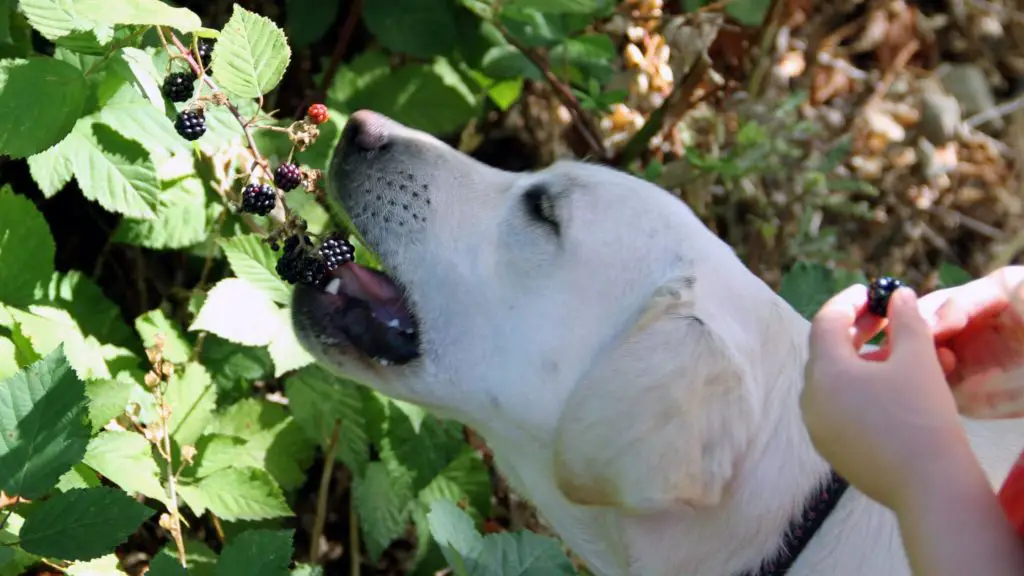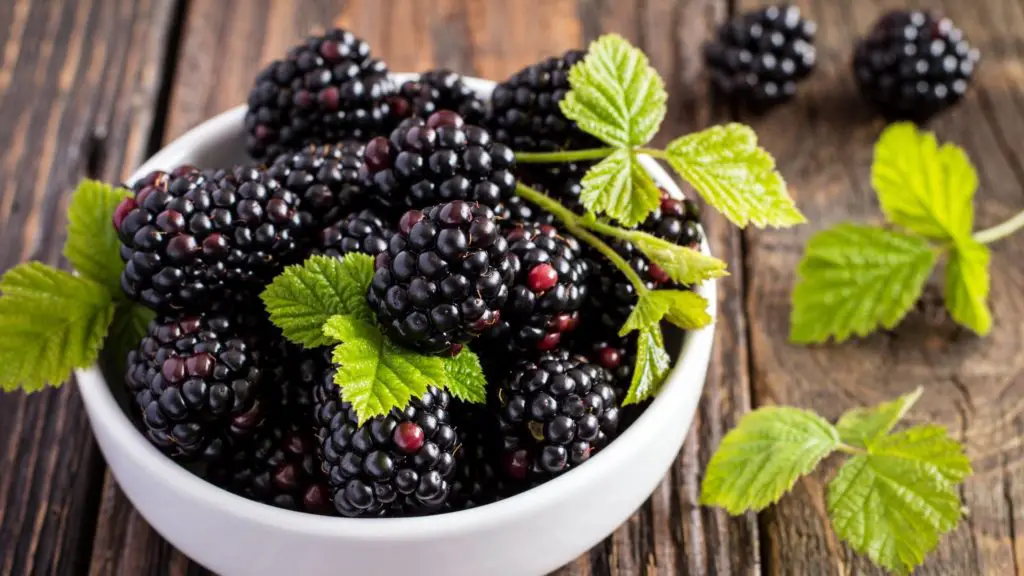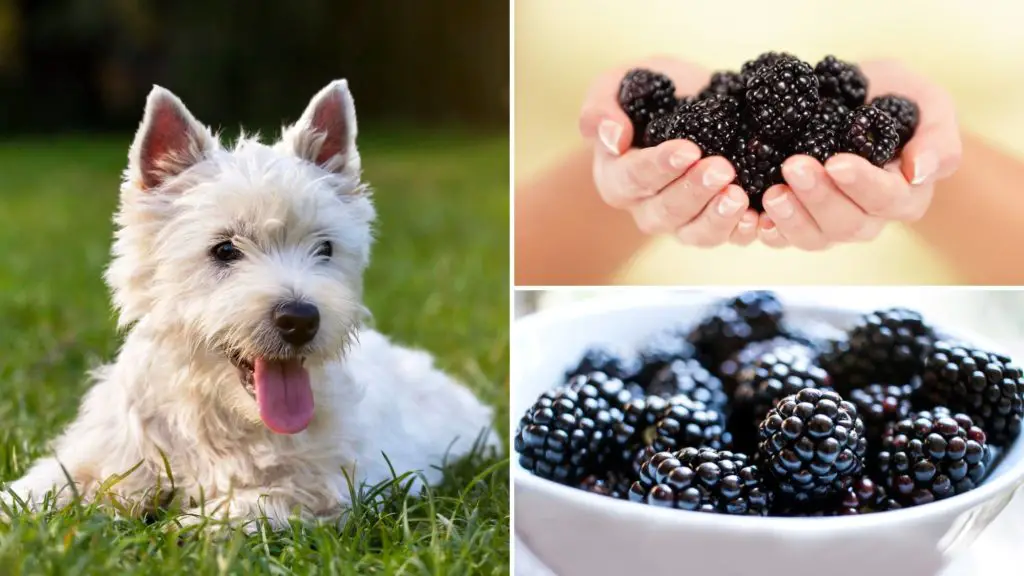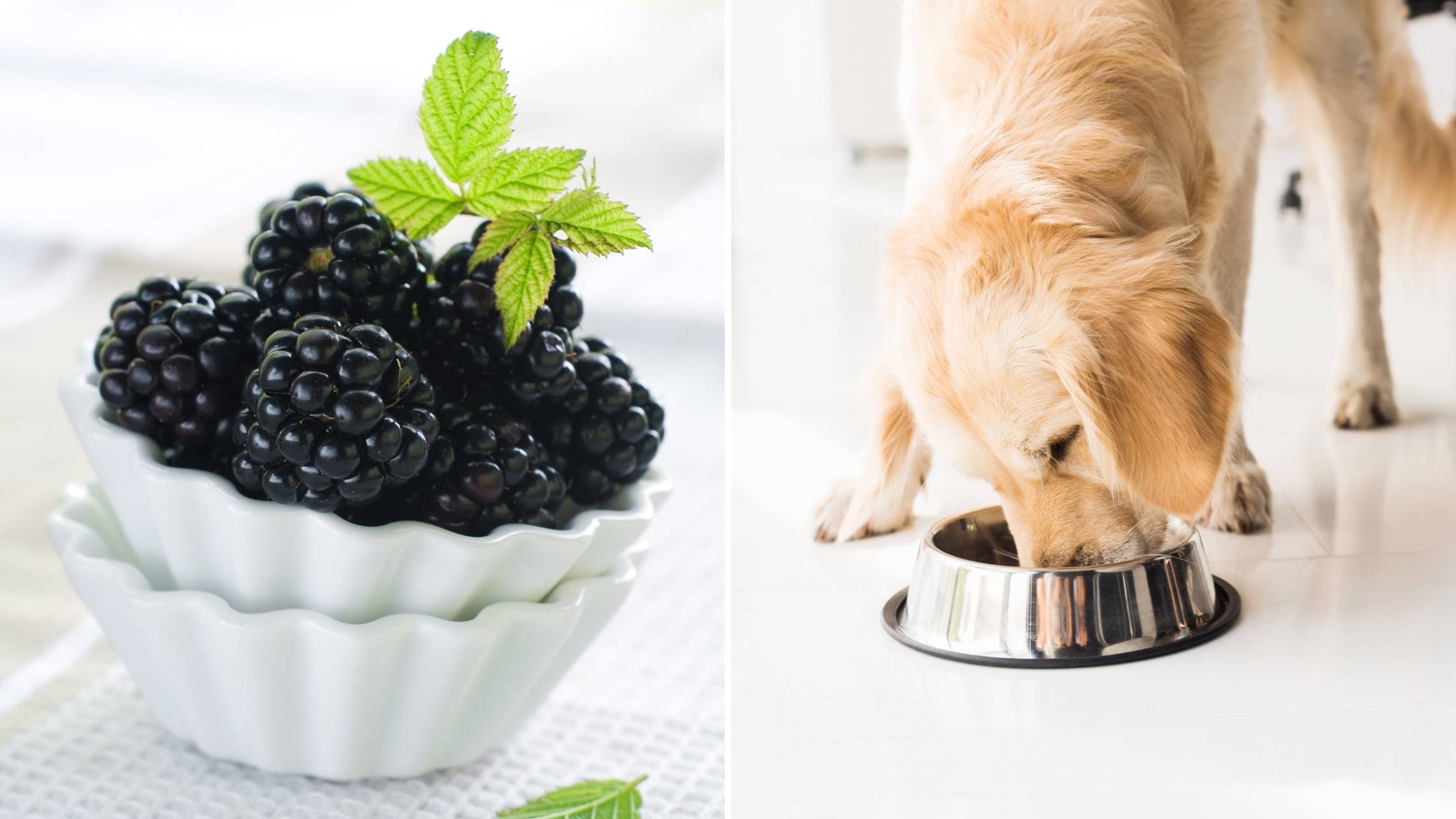Last Updated on 05/18/2021 by Veronica Jones
It’s great to be able to give your dog a variety of foods. While dogs are primarily carnivores, they can have some other food groups to stay healthy and happy. However, dogs are not like humans, so what kinds of food they can eat?
So, what about blackberries? Are blackberries safe for dogs? Do they have any health benefits? What are the key considerations for dog owners? Let’s find out…
Can Dogs Eat Blackberries?
Yes, dogs can eat blackberries. They are a great treat for dogs to have in moderation. They contain lots of vitamins and minerals that make dogs strong and healthy. However, they cannot be a daily treat for dogs. They are also not good for overweight and diabetic dogs.
Blackberries will not replace a dog’s natural diet. However, they can be a healthy snack for dogs to have occasionally. Blackberries can give them a small health boost, and many dogs like them.

Are Blackberries Good for Dogs
Dogs are mostly meat-eaters, but vitamins can still benefit dogs to support their overall health. Blackberries have tons of vitamins that are great for dogs. For instance, they have vitamin C to boost a dog’s immune system. Vitamin C is also an antioxidant, which gets rid of free radicals that harm healthy cells. Antioxidants can prevent disease and decrease the aging process.
Blackberries have vitamin A that can also support a dog’s immune system. This essential vitamin also helps support vision, which is great because dogs usually have poor vision when they age. Vitamin A is also important for bone growth and reproduction. Plus, vitamin A can work like antioxidants.

Another crucial vitamin for dogs that blackberries have is vitamin D. Vitamin D helps dogs maintain and grow strong bones. Therefore, it is great for growing puppies and senior dogs. Plus, vitamin D is partially responsible for a body’s ability to control inflammation. Moreover, new research suggests that it also helps maintain cell health and regulating genes.
Blackberries also have a B-complex vitamin called thiamine. It is an essential vitamin for dogs because it supports organ health and regulates energy. It can also aid a dog’s eyesight and enhance motor function, helping dogs stay mobile and active. It is also good for their digestive system because it aids the breakdown of carbohydrates.
Another B vitamin that blackberries have is folic acid. It is great to give to pregnant dogs to prevent the risk of cleft palates in puppies. It also helps their bodies produce red blood cells. Plus, it can improve a dog’s digestive health, skin and fur.
Blackberries contain vitamin E that is another antioxidant to prevent illness and damage to cells. Vitamin E also helps support fat metabolism and cell function. Vitamin E deficiency can cause reproductive issues, weak muscles and poor eyesight. Therefore, vitamin E can support a dog’ health in the right amounts.
Vitamin K is an essential vitamin for dogs because it helps blood clot. That way, a dog can quickly stop bleeding if they get a wound or an injury. If dogs eat poisons, like rat poisons, can keep a dog’s body from using vitamin K. Vets use vitamin K therapy to stop that process. Therefore, vitamin K is a crucial vitamin for dogs to have.
Blackberries also have a lot of great minerals for dogs. One of the minerals that they have is calcium, which is crucial for healthy teeth and bones. Strong bones are important for growing puppies, active dogs and older dogs. Additionally, calcium can help muscle function, which is great for all dogs, especially active ones. Plus, they have phosphorus that helps the calcium’s effectiveness.
Blackberries contain copper, which is crucial for dogs in small amounts. Copper prevents anemia and helps dog’s bodies absorb iron. It forms red blood cells that carry nutrients and oxygen to the organs. Copper helps dog’s coats produce melanin so they have healthy looking fur. Moreover, copper aids the formation of connective tissues, collagen and bones.
Blackberries have potassium that supports a healthy heart and kidneys. Moreover, potassium helps the function of the muscles and nerves. Dogs that have a potassium deficiency are often tired with little appetite. Therefore, potassium is great to have a healthy and happy dog.
Another crucial mineral for dogs found in blackberries is zinc. Zinc helps keep a dog’s coat and skin healthy. It also helps support the immune system. Moreover, zinc also promotes good thyroid function.
Blackberries are low in calories. Dogs do not need as many calories as humans do, so a few can be a low-calorie treat. Therefore, it can be a great snack for pet owners to give to their dogs because they will not go over their daily calorie intake. However, dogs cannot eat this fruit all day because it is only a treat for dogs.
Side Effects of Blackberries
Overweight and diabetic dogs may not have blackberries. Blackberries are a healthy fruit, but they are also high in natural sugar. Dog’s bodies are different, so they are more sensitive to natural sugar than humans. Therefore, they would easily gain weight if they have too much natural sugar. Moreover, blackberries are not ideal for diabetic dogs because it can make their blood sugar levels unstable.
Blackberries contain a little xylitol, which is a natural substitute sweetener. The amount that blackberries contain is very small, but xylitol is toxic to dogs. However, it would take a lot of blackberries to poison a dog. So, a dog can eat the recommended amount on occasion, but it should not eat more than that.
Blackberries are an overall healthy treat for dogs, but not all dogs the same. Some dogs have more sensitive stomachs, so they may get an upset stomach, diarrhoea, etc. from a few blackberries. In very rare cases, a dog may be allergic to blackberries. Therefore, it would be best to give a dog blackberries in small amounts slowly and in moderation to see how it reacts.
What Kind of Blackberries Can Dogs Have?
It is best for dogs to have fresh blackberries. Ideally, pet owners should feed their furry friends organic blackberries. Non-organic blackberries can contain pesticides and other chemicals that could harm their bodies. Therefore, organic and fresh blackberries are the best kind of blackberries to give to dogs.
It would be best for dogs to avoid wild blackberries. Many people spray pesticides on blackberries. The chemicals get absorbed into the plants roots and leaves. Therefore, it will not quickly leave a plant’s system. If a dog consumes chemicals and gets poisoned, which can cause lethargy, diarrea, fever, vomiting, seizures, etc.
Can Dogs Have Food with Blackberries in It?
It mostly depends on the food. However, it would be best to avoid giving most human foods to dogs, even if they contain blackberries. Some recipes will contain more blackberries than a dog should eat, so it could be too much for them. Additionally, many recipes call for other ingredients that dogs cannot have, so it would be best to stick to fresh blackberries.
Can Dogs Have Blackberry Jam?
No, dogs cannot have blackberry jam. Similar to having certain foods with blackberries in it, blackberry jam has other ingredients that are not good for dogs. Blackberry jam often contains many additives, like preservatives and sugar. These ingredients can harm a dog’s body, causing them to gain weight, vomit, have abdominal pain, etc.
Can Dogs Have Other Kinds of Berries?
Yes, dogs can have most other kinds of berries. Dogs can also have raspberries, blueberries and strawberries as other fun berry snacks. Similar to blackberries, these berries should only be treats. Overall, all of these berries have lots of nutrients to benefit dogs.
However, dogs cannot have cherries. The cherry flesh is fine for dogs, but the rest of the cherry is not. The leaves, stems and pits of cherries have cyanide, which can poison dogs. The cherry pits could also be a choking hazard for dogs, so it is best to avoid them. Moreover, maraschino cherries are usually bad for dogs because they have more sugar than other cherries.
How Many Blackberries Can Dogs Have?
Most healthy dogs can eat a small handful of blackberries. However, it will also depend on their overall size and health. For instance, a big dog can have a handful of blackberries 1-2 times a week. A big active dog can easily burn off the sugar, so that amount is ok for them.

Medium dogs can have a small handful of blackberries once a week. If they are active, they can have it 1-2 times a week. Small dogs ought to stick to 3-4 blueberries a week. It is fine for small dogs to only have that amount since they have much smaller stomachs.
Be careful about how much a dog new to blackberries eats. Even if they are big dogs, they can still have sensitive tummies. There is also a rare chance that the dog is allergic to blackberries. Pet owners can offer their dogs 2-3 blackberries and observe their dogs for 12 hours. If there are no side effects, the dogs can have a few more blackberries after a few days.
How to Feed a Dog Blackberries
There are many ways to feed a dog blackberries. The easiest way to feed dogs blackberries is to give it to them fresh. Fresh blackberries that have no black spots are fine. They can eat it out of their owner’s hands or from their bowl.

There are many dog toys, like a Kong toy, that let pet owners put treats into it to encourage their dogs to play for mental stimulation. Blackberries are relatively small, so they can fit in most treat toys. It is a great low-calorie alternative to store-bought dog treats. However, it would be best to freeze the blackberries before putting them into the treat toys. That way, it can prevent mess and challenge the dog more.
Frozen blackberries are great to give to dogs. Dogs love this cold and crunchy treat on hot days. Therefore, it is great to help cool them down. Plus, it can extend the shelflife of blackberries so pet owners can keep the berries for months. Additionally, pet owners can put blackberries into veggie and fruit popsicles for dogs.
Many dog owners make homemade treats for their furry friends. Therefore, dogs can eat baked blackberries if it is baked into a dog treat. However, pet owners ought to only add the recommended amount of blackberries stated in the recipe. If a dog has too many blackberries, it can be bad for their health.
Pet owners can also puree blackberries as a fun treat. Pet owners can blend blackberries with other doggy-safe fruits and veggies, and even a little sugar-free peanut butter. Blackberry puree is great for dogs who are bored of their dry food. People can pour a bit of puree over their dog’s dry food to encourage their dogs to eat it.
No matter what method a pet owner chooses, they should wash the blackberries skin before giving them to their dogs. Even organic blackberries can have dirt on them. Therefore, the blackberries should be clean and organic.
Can Puppies Have Blackberries?
Yes, puppies can have blackberries. However, it depends on how old the puppies are. Puppies that are 0-2 months old will mostly rely on their mother’s milk and puppy food. Additionally, puppies have very sensitive stomachs, so they might react badly to blackberries. Therefore, it would be best to give puppies blackberries when they are at least 7-8 months old. However, they can only have a few blackberries first until they are older and used to blackberries.
In Summary
Overall, blackberries are a healthy snack for dogs. They are low in calories and full of nutrients, making them an excellent health-boosting treat for dogs. It is a treat that they can have in moderation. However, it is not ideal for overweight and diabetic dogs because it has a lot of sugar.
References:
- PetFinder, ‘Q&A: Do Dogs Need Vitamins?’, https://www.petfinder.com/dogs/dog-nutrition/do-dogs-need-vitamins/, Accessed Date – 06 May 2021
- Animal Biome, ‘Your Dog Needs Vitamin D, but Too Much Can Be Toxic’, https://www.animalbiome.com/blog/your-dog-needs-vitamin-d-too-much-can-be-toxic, Accessed Date – 06 May 2021
- VCA Hospitals, ‘Xylitol Toxicity in Dogs’, https://vcahospitals.com/know-your-pet/xylitol-toxicity-in-dogs, Accessed Date – 06 May 2021
- Vet Guru, ‘Best Dog Food for IBD [Reviewed 2021]’, https://www.vetguru.com/best-dog-food-for-ibd/, Accessed Date – 06 May 2021
FETCH by WebMD, ‘Diabetic Dog: Tips to Manage Their Diet’, https://pets.webmd.com/dogs/diabetes-dog-diet#1, Accessed Date – 06 May 2021

